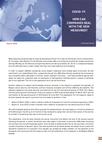
COVID-19: how can companies deal with the new measures?
COVID-19: how to deal with the new measures?
New measures are being taken to stop the spreading of Covid-19 in view of limiting the risk of contamination.
On Thursday night Belgium Prime Minister announced cafés and restaurants would be closed, schools too
starting Monday, all recreational and sporting events are being cancelled, etc. As for a company/employer,
this will definitely have a major impact and may rise a few questions and problems.
In order to support affected companies, some support measures have already been announced. As also
mentioned in our latest Mazars Info, companies that get into difficulties directly caused by the coronavirus
(e.g. cancelled orders, decrease in turnover, import to/export from Asia, …) and have problems paying their
taxes, can apply for a payment plan, an exemption of late payment interests and/or a waiver of penalties due to non-payment. The link to the application form can be foundhere
Another measure to support self-employed persons, consists in the request to postpone the payment of
Belgian social security contributions, without charging increases and without affecting the benefits. The
measure applies to the social security contributions for the first and second quarter of 2020. This means
that the social security contribution of the first quarter of 2020 must be paid before 31 March 2021 and the
contribution of the second quarter of 2020 before 30 June 2021. The application for this measure needs to
be done towards the social insurance fund and needs to be done in time:
- before 31 March 2020 in order to obtain a deferral of payment for the first and second quarters of 2020;
- before 15 June 2020 in order to benefit from a deferral of payment for the second quarter of 2020.
The self-employed persons who where granted this postponement, can also apply for a financial allowance
of €1,582.46 (per month) up to 12 months if they temporarily cease their activity (interruption of the activity
for at least 7 consecutive day) due to the corona virus).
This application must be done towards the social insurance fund before the end of the second quarter
following the quarter in which the activity was interrupted. In the event of economic difficulties (including
the coronavirus), the self-employed person must be able to demonstrate that he has accrued a minimum
number of quarters of pension rights. The more quarters he can demonstrate, the longer he can invoke this
allowance (maximum of 4 quarters). This request can already be made, however, for the payment of the
allowance, the insurance fund still needs to wait until the publication of this measure in the Belgian Official
Gazette.
The Belgian government also made some recommendations towards companies on how to continue their
business in these specific and exceptional circumstances, such as the recommendation for employees to
work from home whenever possible, to keep meetings to a minimum and try to adjust the working time
temporarily as well.
In this respect, it can be interesting to already have a homework policy in place. This policy lays down the
rules for working from home, such as the availability, the use of equipment, etc. so that no problems can
arise.
In addition, it may be interesting to take a closer look at the possibilities in the context of flexible working
hours. After all, these rules make it possible to temporarily adjust working hours, for example to reduce
them in the first instance and thus to adjust the working hours in order to organise the childcare. The
average working time can be spread over a broader reference period, so that any “less hours” can be caught
up at another time, once the centre of gravity of this crisis has passed, by working slightly more hours. All
this can be done without causing major fluctuations in remuneration.
If these adjustments cannot be made or in case they are difficult to apply due to the company activity, the
coronavirus may lead to the introduction of temporary unemployment due to force majeure. The employee
will receive an allowance of 70% (until June 30, 2020) of the capped salary (max. 2.754,76 EUR per month).
Companies affected by the spread of the corona virus by a decrease in their customer base, production,
turnover, orders, etc., which makes it impossible to maintain normal working arrangements, may invoke
temporary unemployment for their employees for economic reasons. The allowance is the same as for the
temporary unemployment due to force majeure, however for companies which temporarily lay off their
white-collar employees, a specific procedure for recognition as a company in difficulty must be made, which
can take some time.
Please note that an employee who is able to work from home, cannot be seen as a case of force majeure. An
infected employee with the coronavirus is unfit for work and cannot claim unemployment benefits.
For more information concerning these measures and information on homeworking or adjusting work
schedules, please do not hesitate to contact us.
Mazars ALTOS


